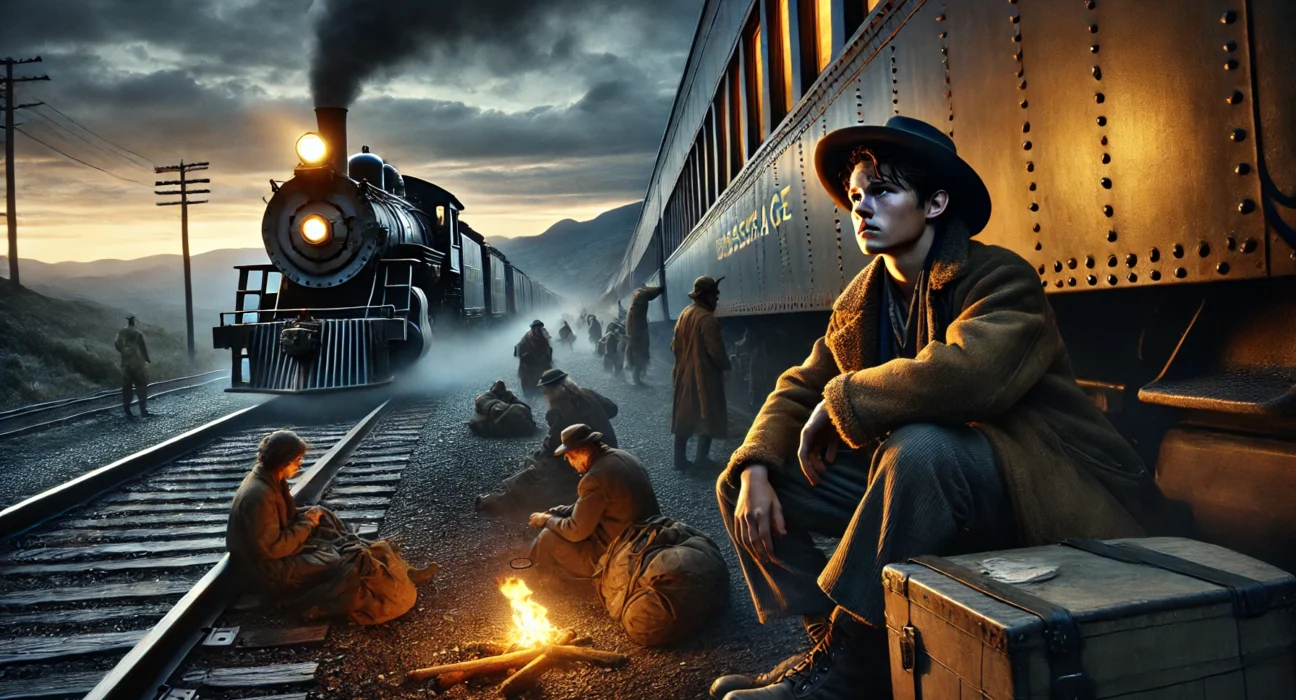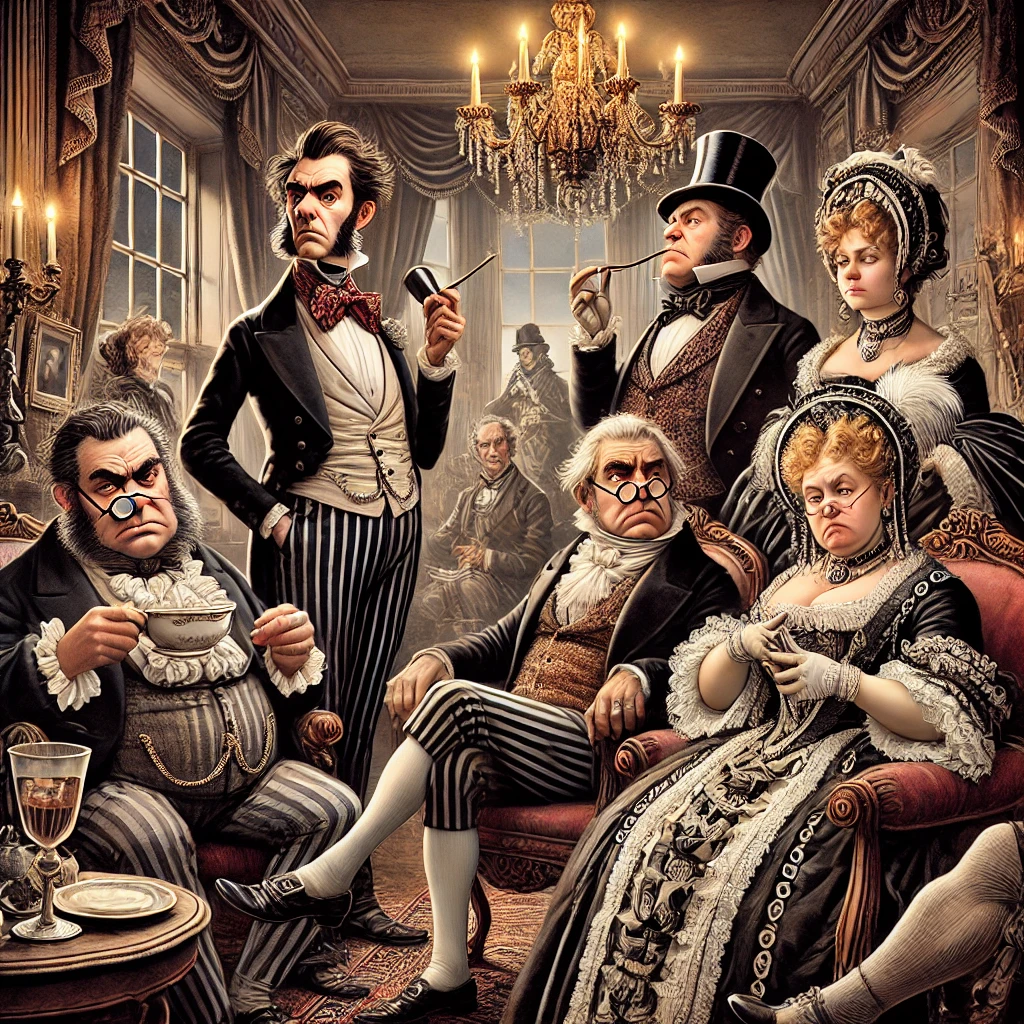“The Road” is a non-fiction work written by Jack London, first published in 1907. It is a semi-autobiographical narrative that details his life on the road as a hobo, riding freight trains, begging for food, and interacting with various individuals along the way. The book captures London’s experiences in the early 1890s, when he left home as a young man in search of adventure and knowledge. It reflects not just his personal adventures but also his deeper insights into society, class, and human nature.
Plot Summary
In the summer of 1892, Jack, a young man navigating life on the road, wanders through the streets of Reno, Nevada. The town, teeming with hoboes, petty criminals, and crooks, offers no kindness to the desperate. Jack is one of many, hungry and without a home, attempting to find food before catching a train west. But Reno proves to be unforgiving. Doors slam in his face, insults are hurled at him, and it seems that no amount of polite requests can soften the hearts of the residents. He is not the only one facing these trials, as fellow hoboes are captured by law enforcement, victims of a newly organized safety committee determined to cleanse the town of vagrants.
One day, as hunger gnaws at his belly, Jack takes a bold risk. He sneaks onto the private train car of a millionaire, narrowly escaping the watchful eye of a porter. With audacity, he asks the millionaire for a quarter to buy food, and to Jack’s astonishment, the man obliges. Jack quickly escapes, the porter furious, but the quarter in hand feels like a small victory in a town where survival seems impossible.
Despite this small success, the rest of the day continues to wear on him. He travels from door to door, begging for food, but receives nothing more than scorn. Finally, as twilight sets in, he knocks on one last door, where a middle-aged woman answers. Her face is kind, and in that moment, Jack knows that his fortune is about to turn. He quickly conjures up a story—one of an innocent, unfortunate boy who, for the first time in his life, is forced to beg. The woman’s heart softens immediately. She invites him in, where her sickly son, his head wrapped in bandages, sits at the table, watching Jack intently.
As the woman busies herself in the kitchen, Jack spins a sorrowful tale. He speaks of his father, who had recently died, collapsing in the street from a sudden illness. Jack paints a vivid picture of those last days, telling her how he had wandered the streets of San Francisco, lost and alone. The woman, moved by his story, serves him a generous meal—eggs, biscuits, and bacon. Jack devours everything in front of him, all the while continuing his tale. He mentions his sister in Salt Lake City, a married woman with a plumber for a husband. They would have sent him money for the journey, he explains, but business troubles have left them unable to help. It’s up to Jack to find his way to them, and the woman, filled with sympathy, packs him a lunch and gives him three pairs of warm socks for the road.
Before Jack can leave, the woman nearly foils his plan by suggesting that her relative, a mail clerk, could hide him in the mail car of the train heading east. Jack, knowing he needs to travel westward, nearly panics but is saved when she realizes the clerk will not be working that night. Grateful for the food and supplies, Jack thanks her and sets off into the night.
In the railroad yard, Jack joins a group of hoboes, all waiting for the westbound overland train. When the train pulls out, a flurry of action begins. The men scramble to secure a place on the blind baggage—a perilous spot between the mail car and the next coach where they can ride without being seen. But the train crew is ready for them. At every stop, they force the hoboes off, tossing them aside with practiced ease. Jack, however, is no ordinary tramp. He uses his agility and quick thinking to stay ahead of the crew, running far along the track at each stop to jump aboard again after the train has picked up speed.
The night becomes a game of cat and mouse, with the train crew growing more frustrated at each stop. Jack, determined to outwit them, climbs onto the roofs of the cars, narrowly avoiding lanterns and the swinging blows of the crew. Each maneuver is more dangerous than the last, as the train speeds through the night, slicing through the cold Sierra Nevada mountains. The wind bites at his skin, but Jack is relentless. Even when the fireman sprays him with water from the engine’s hose, Jack finds shelter beneath the tender and keeps his place on the train.
At one point, Jack reflects on the pride he feels for holding his own against the entire train crew. The adrenaline and danger excite him, filling him with a sense of triumph as he remains the last hobo on board. But he knows he must stay alert; the crew is determined to “ditch” him at any cost.
In another city, Jack’s travels bring him to Ottawa after a grueling six-day journey from Montreal. Desperate for food and clothing, Jack spends an entire day begging housewives for even the simplest necessities, only to be rejected time and again. His persistence is rewarded when, at the end of the day, a large handout is placed in his hands. However, when Jack eagerly opens the package, he discovers, to his dismay, that it’s filled entirely with cake—a food he despises. His frustration is palpable, yet fate has more in store for him. Shortly after, he is welcomed into the home of a grizzled Englishman, his wife, and a beautiful young Frenchwoman, where he finally enjoys a warm meal and some much-needed rest.
Back at the railroad yard, Jack once again prepares to board a westbound train. This time, he faces a larger group of tramps, all eager to catch the blind baggage. But Jack’s knowledge of the railroad system and his quick reflexes allow him to outmaneuver not only the other tramps but the train crew as well. He reflects on the intense physical and mental challenge of riding the rails, especially the “blind baggage,” which requires precise timing and a willingness to take extreme risks.
As the train roars into the night, Jack’s battle with the crew reaches a fever pitch. He leaps from car to car, dodging the lanterns of the brakemen, always one step ahead. By the time the train reaches its next stop, Jack is the last hobo standing, having outwitted the crew at every turn. His journey west continues, but now with a deeper understanding of the skills he has honed, the dangers he faces, and the resilience required to survive life on the road.
Main Characters
Jack London (The Narrator): Jack London, the protagonist and narrator, is a resourceful and adventurous young man. His time on the road reveals his wit, determination, and skill at surviving in difficult conditions. He’s portrayed as sharp-minded, quick to adapt, and skilled in manipulating situations to his advantage. His journey as a hobo is a formative experience, shaping his understanding of human nature, social inequality, and his own identity.
The Hoboes: These fellow travelers represent various facets of life on the road. Some are skilled and experienced like Jack, while others are clumsy and less fortunate. Their camaraderie, combined with the competitive nature of surviving on the rails, reflects the bond of shared hardship.
The Train Crew (Shacks and Policemen): Constant antagonists in Jack’s journey, the train crew—particularly the “shacks” or brakemen—are depicted as persistent, often harsh figures whose job is to keep hoboes off the trains. Jack’s evasion of them forms a major part of the narrative, highlighting the tension between the hoboes and authority.
The Woman in Reno: A middle-aged woman who shows Jack kindness, she embodies the compassion that is often found among the poor and lower classes. Her willingness to believe Jack’s fabricated story and provide him with food and supplies stands in contrast to the cold indifference shown by wealthier people in the narrative.
Theme
Survival and Resourcefulness: Central to the narrative is Jack’s relentless quest for survival. Whether it’s finding food, evading authorities, or catching a train, Jack must continually adapt to the challenges of the road. His quick thinking and agility are portrayed as key survival traits, and the book highlights how life on the margins sharpens these instincts.
Social Inequality: A powerful theme throughout the book is the stark divide between the rich and the poor. Jack frequently contrasts the kindness of the poor, who share what little they have, with the cruelty or indifference of the wealthy, who view hoboes as beneath them. This reflection on human nature highlights the inherent inequalities in society and raises questions about who holds power and why.
Freedom and Transience: Jack’s journey as a hobo reflects both the allure and the peril of freedom. The open road offers endless possibilities and the excitement of adventure, but it also means living without stability or security. Jack’s experiences on the train symbolize this transient freedom, where every new destination brings both hope and danger.
Brotherhood and Isolation: Though the hoboes form a loose brotherhood of sorts, the life they lead is inherently solitary. Jack shares fleeting moments of camaraderie with fellow travelers, but the journey is ultimately one of isolation. The road is lonely, and Jack’s success often depends on his own wit and determination, emphasizing the duality of companionship and solitude.
Writing Style and Tone
Jack London’s writing in The Road is characterized by vivid realism, capturing the gritty details of hobo life. His language is straightforward yet evocative, drawing readers into the harsh realities of traveling by freight train, evading the authorities, and begging for sustenance. He writes with a journalistic eye for detail, but his voice also carries a deep sense of empathy for the people he meets and the struggles they endure.
The tone of the book fluctuates between philosophical contemplation and gritty pragmatism. London’s reflections on the nature of poverty, the human spirit, and societal structures lend the narrative depth beyond mere storytelling. Yet, he also embraces the adventure and humor of hobo life, showcasing a resilient optimism even in the face of hardship. His ability to balance these elements—philosophy, adventure, and survival—creates a rich, multifaceted narrative that is as much about personal growth as it is about his travels.
We hope this summary has sparked your interest and would appreciate you following Celsius 233 on social media:
There’s a treasure trove of other fascinating book summaries waiting for you. Check out our collection of stories that inspire, thrill, and provoke thought, just like this one by checking out the Book Shelf or the Library
Remember, while our summaries capture the essence, they can never replace the full experience of reading the book. If this summary intrigued you, consider diving into the complete story – buy the book and immerse yourself in the author’s original work.
If you want to request a book summary, click here.
When Saurabh is not working/watching football/reading books/traveling, you can reach him via Twitter/X, LinkedIn, or Threads
Restart reading!








